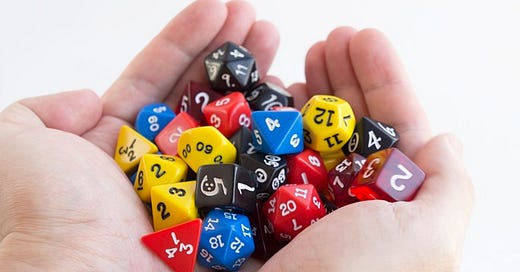DMs: Don’t Write a Novel (or Do)
DM Advice, RPG Videos, Wishlist, Robinson Crusoe on Mars, and Much More...
We sharpen our GM skills through stories and knowledge.
The newsletter is approaching 10,000 subscribers, which is amazing. If you’d like to help it reach that milestone, please share the newsletter using the button below.
Overzealous dungeon masters (of which I am one) can go overboard creating D&D campaigns. Here are some quick tips to avoid writing a novel that you force your friends into believing is a campaign.
Don’t create huge plots
Don't create huge, intricate plotlines. The players need agency to make meaningful choices for the game to be fun and fulfilling for all.
Plot happens when the protagonist of a novel or story makes choices, causing one event to lead to another. This leads to exciting fiction like Raiders of the Lost Ark or The Lord of the Rings.
So, what’s the problem? Let’s consider this. Player characters are the protagonists of a D&D campaign. Unlike the novelist or filmmaker, dungeon masters do not know what actions the protagonists will choose.
Since a plot requires certain actions to happen before something else can happen, how can you be sure your players will perform the trigger action?
I found myself on numerous occasions wanting to tell my players, “You didn’t swim to the bottom of the pool to get the key. You didn’t fall in love with the enemy spy. You didn’t search the baron’s library. Now, since you didn’t do that, the campaign can’t move forward.” (This would be about the time I’d introduce a GMPC to show the players how the plot was supposed to happen. Yeah, I wasn’t a good DM for a long time, but I learned.)
If you already have a plot in mind, frustration lies ahead for you and your players. Resist the urge to create a plot. Allow the players to make choices and then see what events follow. Hit them with a cool situation and then react.
If you have a huge interwoven plot, write a novel
If you've created some huge, interwoven plot in an original fantasy world or science fiction world of your own, write a novel. But please do not run the plot as a game.
You can use the setting. You can use concepts from the setting or characters. But if you try to GM your players through a plot, you will be disappointed.
If you’ve created a huge world with vast locations and the great downfall of the Evil One, my advice is to write a novel.
It has never been easier to write a novel
It has never been easier to write a novel. Well, let me rephrase that—it has never been easier to publish a novel. If you find yourself craving huge, intricate plotlines and crafting stories that span the time from creation to Armageddon, write a novel. I wrote one myself.
You can easily self-publish your novel and send it out into the world. Or try to go the traditional publishing route. Or just write for yourself.
Plot is a dangerous thing in RPGs
Just to reiterate, if you have a set plot in mind, you will be hurting the campaign in a number of ways. You will restrict your players' freedom, and it will frustrate your own plans because they are “not doing it right.”
So for everyone's sake, save the plot for your novel and throw interesting situations at your players—then react to what they do.
If you’d like to read more of my thoughts on running games, check out my book: The No-Prep Gamemaster: Train Your Brian to Run Tabletop Roleplaying Games.
RPG Wishlist
D&D Titles
RPG Articles
RPG News from Around the Web
The remaster of classic D&D RPG Neverwinter Nights 2 is finally real, and releasing next month
The Electric State Roleplaying Game review: "The quintessential road trip movie turned TTPRG"
The Screening Room
Game Masters can draw inspiration from movies to create better, more engaging sessions.
‘Star Wars’: Mia Goth to Play Villain Opposite Ryan Gosling in ‘Starfighter’
‘How to Train Your Dragon’ Review: DreamWorks Live-Action Remake Retains Charm but Plays It Safe
Seth Rogen, Kieran Culkin Voice Ambitious Pigs in First Footage From Andy Serkis’ ‘Animal Farm’
Bill Pullman & Rick Moranis Returning For New ‘Spaceballs’; Keke Palmer Also Set “A Non-Prequel Non-Reboot Sequel Part Two but with Reboot Elements Franchise Expansion Film.”
Robinson Crusoe on Mars (1964)
I finally sat down and watched this. I had seen clips and read about it while studying film special effects, but I don’t think I had ever seen the entire film before.
It was fun and enjoyable, though clearly made in a different era. The pacing is quite slow, and the main plot doesn’t begin until about the one-hour mark.
The effects look dated by today’s standards, but we shouldn’t judge them—or the pacing—by modern expectations. The effects display creativity and imagination on a grand scale.
It was shot against the stark backdrop of Death Valley and directed by Byron Haskin (The War of the Worlds, From the Earth to the Moon, The Naked Jungle).
As GMs, we can take away the lesson that survival is a passive goal, and players need more active objectives for their characters. It’s free with ads on YouTube.
More from the Red Planet




